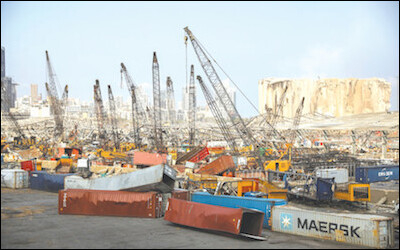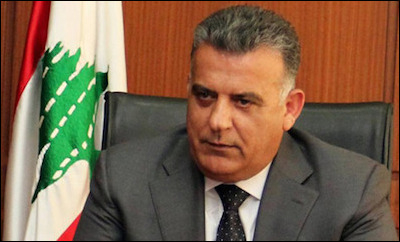Exploiting Lebanon
Exploiting Lebanon
"There should be international efforts to help Lebanon, not to impose anything on it." "It is not humane to exploit the pain and suffering of the people for political goals." Mohammed Javad Zarif, Iranian foreign minister, Beirut
 |
| The explosion at a Beirut Port warehouse tore out a crater 200 metres across that filled with seawater.(AP: Hussein Malla) |
"Hezbollah possesses a military force, according to an estimate by the Janes Information Group, of 25,000 full-time fighters, along with 20,000-30,000 reservists. The official army, the Lebanese Armed Forces, has 72,000 personnel, but it is riven with sectarian division. Thus, Hezbollah has an armed capacity in Lebanon superior to all competitors, including the army of the nominal state."
"But it is at the unseen level that the power of the Hezbollah deep state is at its most profound. The head of the country's most powerful security organ, the General Directorate of General Security (GSDG), is General Abbas Ibrahim. Ibrahim is a close ally of Hezbollah. This is no great secret in Lebanon. Ibrahim is close to, and appears regularly in public with, Wafiq Safa, the head of Hezbollah's security apparatus. Safa, meanwhile, as described by Lebanese Druze leader Walid Jumblatt with admirable simplicity, "decides what the army and security forces can do." Jonathan Spyer, Middle East Forum
Gen. Abbas Ibrahim, head of the General Directorate of General Security (GSDG), is a close Hezbollah ally.
 |
| Hezbollah power structure in Lebanon's ports. (Reuters) |
Hezbollah is the de facto controller of Lebanon. And the Islamic Republic of Iran controls Hezbollah. The al-Quds division of the Islamic Revolutionary Guard Corps formed the Party of God, instilled in it a death cult, and trained and incited it to become a leading terrorist group with an especial focus on the destruction of the state of Israel. The close to 3,000 tons of volatile, explosive ammonium nitrate was stored in a Beirut port warehouse for the express purpose of stockpiling it for future use as an explosive, irrespective of its original, aborted destination via a rustbucket Russian ship moored at the port with its crew. A crew that knew very well the destructive capacity of the material and conveyed that to port authorities.
The same port authorities who repeatedly petitioned government agencies to remove and secure the stockpile, away from public, populated areas of the city. Those warnings were studiously ignored for six years, and those same port authorities are now being judicially questioned after having been arrested by the now-caretaker government of Lebanon, hoping to find a culprit that will lead them to an outside source they claim they suspect had tampered with the ammonium nitrate. The government authorities also rejected an international enquiry into the explosions, though one will proceed with the aid of the FBI.
 |
| Wickipedia |
Syria, Iran and Hezbollah have destroyed Lebanon. Their interference in the unstable country with its sectarian, ethnic, tribal and clan complexities has ensured that the old system of cooperative government will never again be possible, where Christians, Druze, Sunni and Shia all had an institutionalized hand in running the government until a civil war broke out, complicated by the presence of Palestinians led by Yasser Arafat leading violent forays into Israel compelling the IDF to enter and succeed eventually in having the militants expelled.
To have Iran, at this juncture, complain that other countries are interfering in Lebanese affairs is the ultimate in absurd irony, but it is typical of what can be expected from the Persian Shiite nation that has been busy roiling the majority Arab Sunni countries of the Middle East with the threat of its ambitions. In effect, the Republic of Iran was the architect of the government that just fell.
And Iran's support of Syrian President Bashar al-Assad's campaign of unmerciful vengeance on Syria's Sunni citizens who rebelled against the Shiite Alawite rule that left them without rights equal to that of the Alawites has done a fine job of destroying Syria as well, thanks to Hezbollah's assistance and Russia's decision to intervene in exchange for a Mediterranean deep sea port and an Russian airbase in Syria.
France and the United States have been busy themselves in Lebanon (In the mid-1980s they formed part of a UN peace corps in Lebanon),
post-disaster, in diplomatic efforts urging Lebanon to extirpate the
corruption infecting its body politic in favour of enacting long-delayed
reforms should it wish to attract foreign financial assistance to aid
it in exiting its disastrous financial dilemma at the very time it also
struggles against COVID, and coping with a million Syrian refugees
on its soil. The presence of Hezbollah, Iran's proxy, as a
destabilizing force in the country has ensured that wealthy Gulf states
withhold investing in Lebanon.
 |
| The force of the blast destroyed buildings in the port district and shattered windows across the city.(AP: Hassan Ammar) |
The angry protests that have highlighted ordinary Lebanese disaffection with their government, disgust with Hezbollah, desperation over the country's financial failures, high unemployment and growing destitution, succeeded in having the government step down after a number of its ministers left the government over the very same issues. "We can't live like this. The West has to pressure our leaders to save us" Lyaam Ghanem, a Beirut pharmacist appealed.
Even while Iran's Foreign Minister Zarif stated that Tehran is prepared alongside private Iranian companies to help in rebuilding and rehabilitating Lebanon's electricity sector. Something that Iranians themselves would be rather upset to know about, given Iran's quite similar financial situation, and its own citizens' disapproval and protests against the ruling mullahs and the power of the Revolutionary Guard Corps which owns so many of the country's most important industries.
 |
| Anti-government protesters burn a barricade next to a wall installed by security forces to block access to the Parliament after the explosion.(AP: Felipe Dana) |
Labels: Hezbollah, Hezbollah Armaments, Iran, Islamic Revolutionary Guard Corps, Lebanon

0 Comments:
Post a Comment
<< Home